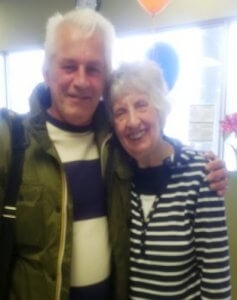Residential Program
Transitional Housing Program
 For a long time, jail was like a second home to me. No matter where else I was living, it was somewhere I always went back to. This is something that has been changing a little at a time over the last few years. Now, my home is my apartment through the Addiction Supportive Housing (ASH) Program.
For a long time, jail was like a second home to me. No matter where else I was living, it was somewhere I always went back to. This is something that has been changing a little at a time over the last few years. Now, my home is my apartment through the Addiction Supportive Housing (ASH) Program.
My name is Wayne and I was asked to describe my experience with Stonehenge. At first, I wasn’t sure what to say, and my counselor told me that I could share whatever I wanted: the good, the bad and the ugly. I think I’ll change that around a bit; I’m going to talk about the ugly, the bad and the good.
I grew up in an abusive family with a father who was a violent alcoholic. I have ten sisters with whom I fought with every day. I felt that I had no standing in my family and I defied all of the rules. Left alone much of the time, I grew up knowing what it felt like to be abandoned and lonely. Even so, at this stage in my life, I swore that I would never drink, and I truly meant it.
When I was seventeen years old, I joined the armed forces. Despite my promises to myself, I was an alcoholic and drug addict by the time I turned eighteen. I spent three months in a military hospital after overdosing on LSD. While I was there, I asked for my release and this was granted. For the next thirty years, I was an alcoholic and became addicted to whatever was available. As a result, I’ve lost jobs, my marriage and my own self-esteem.
For years, jail was like my second home. It was there that I felt the most comfortable. It was a boys club and my social circle. After many months in jail over many years, I just gave up on trying to be someone. In 1999, I was sentenced to nine months in an institution in Ottawa that also had a treatment facility. While I was there, I applied to the Stonehenge residential treatment program and was accepted. The process of treatment was painful. Sharing the facts of my life with others left me feeling heartbroken and exposed, but I stuck with it and successfully graduated.
In 2009 I returned to the residential program and remained there for four months. During this admission, I had my first experience with art therapy which was, and still is, very impactful in my life. Today art is an outlet for me; a place to express my thoughts, emotions and feelings. Throughout every stage of my recovery and journey, this has remained important to me and is part of who I am.
The bad and ugly are not the end to this story. Let’s talk about the good – the best – the ASH Program. I have been in the program for about five years. In that time, I have worked hard to build an honest, caring relationship with my worker. I have maintained a home and, although I still struggle with addiction, I have more stability every day. The ASH Program has helped me find purpose and hope that I can turn my life around. Without it, I would be like a lot of my so-called friends; empty.
Today, I’m still learning. I struggle with money management and doing the things I need to do day to day to take care of myself. However, I live in a place where I am allowed to struggle and work through these struggles without fear. I have a great relationship with my superintendent; I am respected and valued at the Drop-in Centre. My family values the stability I have found in my life and I have been able to re-establish a relationship with my daughter and grandchildren as a result. I am able to focus on my creative side through my artwork and poetry. I have had my artwork displayed throughout Guelph, including at the Community Health Centre. My communication skills have improved and continue to improve and most importantly, I am feeling better about myself than I have in a long time. It’s not perfect, but it’s a start.
Stonehenge was my doorway to a better life and the ASH Program has helped to make that real. I now have a place to call home and am confident in my abilities to work through the ongoing issues in my life. Without the ASH Program, God only knows where I would be.
I began this story by telling you that jail used to be my second home; today I can say that this is not the case. It has been nearly two years since my last incarceration and when I left, I was able to confidently say I had no desire and no need to go back; I have a home.

